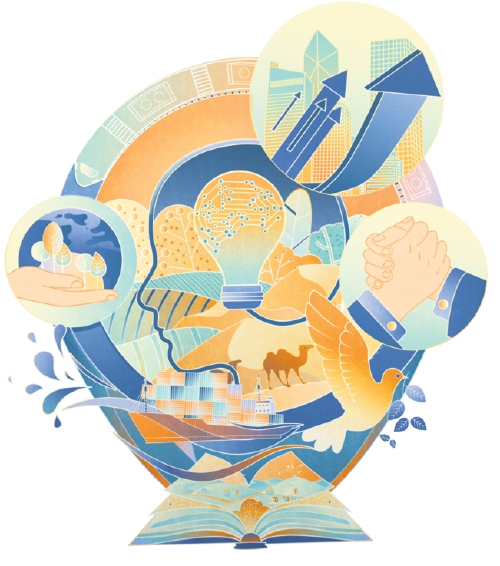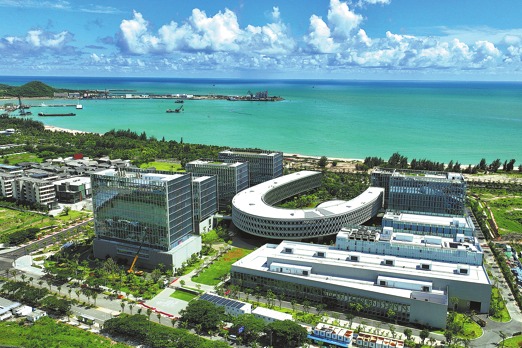Vive la difference


Editor's note: The world has undergone many changes and shocks in recent years. Enhanced dialogue between scholars from China and overseas is needed to build mutual understanding on many problems the world faces. For this purpose, the China Watch Institute of China Daily and the National Institute for Global Strategy, Chinese Academy of Social Sciences, jointly present this special column: The Global Strategy Dialogue, in which experts from China and abroad will offer insightful views, analysis and fresh perspectives on long-term strategic issues of global importance.
China and the West have long history of being unsure how to view each other
Over the period of the COVID-19 pandemic, I remember wondering why in recent years the dialogue between the West and China had become so fractious and difficult. It seemed that every day there were more arguments and fights on social media and elsewhere. Sitting in the United Kingdom, I was struck by how the people with the loudest, most certain opinions about the situation were those who clearly knew very little — politicians, journalists, and social media writers who seemed full of certainty about what they were saying, making very complex things black and white.
My book China Incorporated was published during this period, and was an attempt to set out why simple positions and arguments on the issue of China's place in the modern world were unlikely to be helpful. This is a complex situation. It is not just that China is politically different from the West. That certainly creates plenty of challenges and issues. But it seemed increasingly to me that there was something deeper running under these tensions.
In 2019, while writing a previous book on the history of modern China, I referenced the works of Gottfried Leibniz, the German philosopher from the 17th and early 18th century. I knew that he had written on China, although I had never looked in detail at what he had said. That led me to also remember that Voltaire a little later had also referred approvingly, at least early in his career, to China. The knowledge of these two was indirect. They had studied the works of the Jesuit missionaries working in the Ming Dynasty (1368-1644) and early Qing Dynasty (1644-1911), of whom the most famous today is Matteo Ricci. But this had given them an awareness of a culture that was different, one that intrigued and to some extent impressed them.
Inspired by this, I decided to put together a collection of the main writings on China by key European figures, from the time of Marco Polo in the 13th century to the late 20th century. I realized that there was no source book where these important materials were gathered together in English in one place. The thinkers I picked were figures who had immense impact on the development of mainstream Western thinking, but had, separately, developed an interest in China. They included Max Weber the father of modern sociology, Betrand Russell the British philosopher, Carl Jung the psychoanalyst, and the German philosophers Georg Hegel and Karl Marx.
It was pretty clear when I selected the key texts that these writers had produced on China that the one thing that united them across their varying perspectives and standpoints was their recognition, however they interpreted it, that the China they either had heard about, or in some cases actually visited, was different. This quality of being different figured a lot in what they said. The challenge for them was how to interpret this, and what sense to make of it.
During the Enlightenment, the German philosopher Leibniz and the French philosophers Voltaire and Montesquieu wrestled with how to make sense of a China with its long civilization and its very (to them) distinctive world view, and the Christian Europe that was their home. Here was a place with a rich literary and philosophical tradition, and one that had seemingly developed wholly unconnected to Europe for most of the past 2,000 years or so.
The Qing governance system fascinated these writers, but it elicited very different responses from each of them. For Leibniz it was a case of trying to empirically understand why and how this system worked, and what sense to make of its underlying worldview. His attempt at a wholly realistic appraisal was countered by Voltaire, who to some degree idealized the Chinese mode of doing things. He compared the selection by exams of a bureaucratic elite with what he saw as the corrupt system in Europe, with the Roman Catholic Church being the most egregious institution.
Against these two perspectives, Montesquieu offered a largely negative portrayal of China as a place of despotism, of absolutist governance centered on the emperor, and of great power inequalities. This he held beside the aspirations for more egalitarian governance then being promoted in Europe, and soon to be embedded in the newly founded United States.
Looking back over this period and the subsequent development of history, it is striking how these three different postures largely still exist. There are those who idealize or demonize China, and then some in between who attempt to give as objective a view as they feel capable. No one, of course, feels that they really capture the full truth. But the disposition of Europe, and of the US these days, is to largely wrestle with a China that continues to be very different, and either feel this is a source of massive tension, or a source of inspiration, or, for the Leibniz of our time, a cause of contemplation.
Compiling this historic source book, and then the further book I wrote on China and its relations with the outside world, the one insight I gained is that the principal issue which the West and China have always had is how to manage their cultural differences with each other. For the West, with its embrace of pluralism, this should surely be a manageable issue. China's rise should not be a huge problem, because in a diverse world, diverse perspectives should be welcome. I remain surprised that it is still proving so hard for some to deal with a world where there is a new player occupying a prominent place whose main characteristics is that they are culturally different. China's differences here might be challenging to become more familiar with, but they should not be threatening. We all need a more positive outlook now. China's global role is a huge opportunity, and offers something fresh. It should not be seen as a threat, even if there are areas where there are challenges and differences.
The author is a professor of Chinese studies and director of the Lau China Institute at King's College. The author contributed this article to China Watch, a think tank powered by China Daily.
The views do not necessarily reflect those of China Daily.
Contact the editor at editor@chinawatch.cn.


































